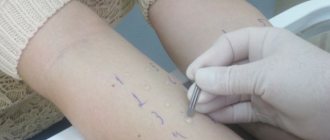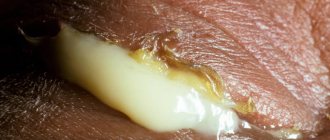The main source of vitamins and microelements should be the diet, but it is not always possible for a person to eat a balanced diet in order to saturate the body with the necessary substances. Vitamin deficiency - avitominosis - disrupts almost all body functions, but it is a rare disease in the modern world. This diagnosis can only be made by a doctor after an examination. For this and many other reasons, you cannot independently prescribe a course of vitamins during the imaginary “spring avitaminosis.”
To understand what the norm and deficiency of vitamins in the body are and whether an ordinary person needs to take synthetic vitamins (multivitamins, vitamins of a certain group), we’ll talk to Irina Valentinovna Martirosova, an expert at the laboratory of personalized medicine LabQuest.
Stock
Antibody test for coronavirus (COVID-19)
from 2000 a
Rapid test for coronavirus (COVID-19)
Results within 25 minutes from the moment the biomaterial is submitted
1600a
Coronavirus (COVID-19) antibody test at home
from 4200 a
Coronavirus (COVID-19) test at home
from 4950 a
Coronavirus (COVID-19) test
2750a
Causes of vitamin C deficiency
Do not think that scurvy has become a thing of history. Nowadays, there are many cases of vitamin C deficiency, which have different causes:
- Abuse of “strict” diets. Girls and women who want to lose weight eat incorrectly, excluding “harmful” foods from the menu. They prefer “store-bought” juices to natural apples and vegetables, which often do not contain anything useful.
- An unbalanced or monotonous diet, as a result of which the body receives few vitamins, including ascorbic acid.
- Taking medications that interfere with the absorption of vitamin C.
- Diseases of the gastrointestinal tract in which the absorption of ascorbic acid from food is impaired.
- Pregnancy increases the consumption of vitamins, because the mother must take them for herself and for the child.
Our clinics in St. Petersburg
Structural subdivision of Polikarpov Alley Polikarpov 6k2 Primorsky district
- Pionerskaya
- Specific
- Commandant's
Structural subdivision of Zhukov Marshal Zhukov Ave. 28k2 Kirovsky district
- Avtovo
- Avenue of Veterans
- Leninsky Prospekt
Structural subdivision Devyatkino Okhtinskaya alley 18 Vsevolozhsk district
- Devyatkino
- Civil Prospect
- Academic
For detailed information and to make an appointment, you can call +7 (812) 640-55-25
Make an appointment
How to get rid of vitamin deficiency
It is difficult to solve the problem with a simple change in diet, because in order to restore the vitamin C content in the body, you need to eat 1.5–2.5 kg of foods rich in ascorbic acid. These are citrus fruits, spinach, walnuts, rose hip decoction, black currants, cabbage, including sauerkraut. Vitamin C is found in meat, milk and other animal products, but there is much less of it.
Therefore, multivitamin preparations containing ascorbic acid are used to treat vitamin deficiency. In severe cases, it is injected into a vein in a glucose solution. Infusion of pine needles effectively restores vitamin C deficiency.
Avitaminosis and hypovitaminosis C can be prevented by taking vitamin supplements. It is especially important to drink them in autumn, winter and spring. It is necessary to take ascorbic acid during pregnancy and serious illnesses that require an increased intake of vitamin C.
Types of vitamins and symptoms of their deficiency
The most important vitamins for humans are vitamins A, B, C, D, E. Their insufficient content can lead to hypovitaminosis (insufficient amount of the vitamin) and vitamin deficiency (complete absence). They can act on the body as a group and be absorbed by the body in the presence of other vitamins.
Vitamin A ensures the normal functions and structure of the mucous membranes and epithelium, regulates the functions of the sex glands and the content of glucose in the blood. Its deficiency can lead to growth retardation, decreased immunity, changes in the organs of vision, skin, digestive and respiratory tract, and impaired secretion of gastric juice. In more severe cases, malignant formations occur and “night blindness” develops.
Vitamin B includes a group of vitamins:
- B1 affects growth and development, increases physical and mental performance, has analgesic, wound healing, and antidepressant properties. With its deficiency, disturbances in the functioning of the digestive, cardiovascular and nervous systems develop. Its low content also causes depression, memory loss, muscle weakness, and in its extreme form leads to Beri-Beri disease.
- AT 2 . Responsible for the condition of the skin, mucous membranes, visual functions, participates in metabolism and synthesizes hemoglobin. Its deficiency can cause:
- loss of body weight and appetite;
- headache, weakness;
- growth retardation in children;
- disorders of the thyroid gland;
- dermatitis, hair loss;
- changes in the cornea, insomnia, slow mental reaction.
- B3 or PP . Promotes energy production, protein and fat synthesis. Symptoms of its deficiency are heartburn, depression, irritability, fatigue, dermatitis, diarrhea, disorientation, hallucinations, and delirium. Failure to do so can be fatal.
- AT 5 . Regulates the functions of the sex glands and adrenal glands, improves the structure of hair, nails and skin. Insufficiency of pantothenic acid, in other words, vitamin B5, manifests itself in the form of apathy, weakness, fatigue, pain in the legs, and impaired heart function.
- B6 (pyridoxine). Increases physical and mental performance, has anti-inflammatory, immunostimulating effects, improves brain metabolism, regulates the functions of the adrenal glands and gonads. Its deficiency can cause: severe hair loss;
- loss of appetite;
- dizziness;
- numbness;
- anemia;
- slow wound healing;
- depression.
- B9 (folic acid) promotes cell division, fetal development, and the formation of red blood cells. Its deficiency in the body leads to anemia, rapid fatigue, weakness, and memory impairment. Children experience weight loss and decreased brain function. In pregnant women, it can lead to miscarriage, placental abruption, stillbirth, and spontaneous abortion.
- B12 normalizes sleep and blood pressure, improves reproductive function, and also increases appetite. If there is insufficiency, cell division processes are disrupted, fatigue increases, and headaches appear.
Vitamin C is also known to everyone as ascorbic acid. Increases the body's resistance to diseases, restores the structure of cartilage and bone tissue. Low content leads to lethargy, decreased performance, and weakness.
Vitamin D acts not only as a vitamin, but also as a hormone. Regulates metabolic processes, reduces lead intoxication. How the hormone affects the cells of the kidneys, muscles and intestines. A lack of vitamin D is manifested by irritability, tearfulness, decreased appetite, and the development of osteoporosis and rickets.
Vitamin E protects cells from destruction, prevents the formation of blood clots, takes part in the synthesis of hormones, ensures the functioning of muscles and supports the immune system. It also promotes the development of the fetus and the continuation of pregnancy, as well as the maturation of germ cells. If there is a deficiency, the breakdown of red blood cells, muscle weakness, sexual dysfunction, and involuntary abortions are noted.
From all of the above, we can conclude that vitamins play a very important role for both children and adults. In pregnant women, they contribute to the successful gestation of the fetus.
Vitamin B12
The main source of vitamin B12 is animal products, so people who, for one reason or another, have excluded meat, fish and dairy products from their diet are at increased risk.
The vitamin is vital for hematopoiesis and the nervous system; it is involved in the synthesis of DNA components.
B12 deficiency is manifested by weakness, dizziness and tinnitus, increased irritability, memory loss, and signs of depression. Excess is accompanied by hives, and according to some reports, skin problems, including pimples and acne. People may experience allergic reactions and increased excitability. There are other symptoms, but these can be learned from laboratory tests.
When are vitamin tests needed?
Doctors are unanimous in their opinion: only for certain conditions.
Low intake of vitamin. This problem occurs in low-income patients suffering from nutritional deficiencies, patients with alcoholism, the elderly and strict vegans.
People who give up animal protein may experience a deficiency of vitamin B12 - it is not found in plant foods. To avoid anemia and damage to the nervous system, vegans should either eat plant-based foods fortified with this vitamin or take a vitamin supplement.
“B12-deficiency anemia can be suspected by certain changes in the general blood test, as well as some patient complaints,” says Anna Redina. “In this case, the doctor will recommend determining the level of vitamin B12 and some other indicators in the blood.”
Malabsorption is a violation of vitamin absorption in the small intestine. This problem occurs in some older people, with celiac disease - a gluten intolerance, with Crohn's disease, which is characterized by inflammation of the gastrointestinal tract, and with short bowel syndrome.
Typically, patients with inflammatory bowel disease are deficient in B vitamins. Doctors often prescribe vitamins in medications or supplements.
Increased loss of vitamin. This happens to patients who need hemodialysis - an “artificial kidney”, and in people with chronic diarrhea.
Disturbed metabolism. For example, with alcoholism, the body uses vitamin B9 more actively, so alcoholics need it more than healthy people.
Inadequate synthesis of vitamin D. People receive part of vitamin D from food, but part is formed in the skin under the influence of sunlight. But in northern latitudes, winters are long and little light reaches the skin. So both the Russian and British ministries of health are worried that the population may not have enough “sunshine vitamin”.
Not surprisingly, guidelines from both countries recommend taking vitamin D supplements at least in the winter and fall, just in case. However, scientists are still arguing about the benefits of this practice.
People who avoid animal foods and patients with diseases that prevent them from absorbing vitamins should consult a nutritionist or their doctor. For vegans, a nutritionist can help you choose the best way to get vitamin B12—from fortified foods or from supplements. And since vitamins are medicine for people with diseases, the attending physician must select the dosage of vitamins individually for each patient.
How to Find a Problem Using Lab Tests
To find out whether there are enough vitamins and minerals in the body, CITILAB doctors have developed a special profile 99-00-801 - the “Source of Health” vitamin and mineral complex. It is part of the Ecology of Life series.
The studies included in this profile simultaneously identify deficiencies and/or excesses of vitamins and minerals. This will help to correct violations in a timely manner and prevent health problems. In addition, the profile includes a comprehensive blood test for the presence of heavy metals and trace elements, an “overdose” of which can lead to a deterioration in well-being. The results of the study are interpreted by a qualified physician.
Profile composition:
- 95-10-200 – Vitamin A (retinol)
- 95-10-205 – Vitamin E (tocopherol)
- 95-10-206 – Vitamin K1 (phylloquinone)
- 26-20-001 – General calcium
- 95-10-201 – Vitamin B1 (thiamine)
- 95-10-202 – Vitamin B5 (pantothenic acid)
- 95-10-203 – Vitamin B6 (pyridoxine)
- 33-20-038 – Folic acid (folates)
- 35-20-010 – 25-OH-Vitamin D
- 33-20-045 – Vitamin B12
- 99-10-100 – Comprehensive blood test for the presence of heavy metals and trace elements
Be healthy!
Unexplained fatigue
This symptom fits almost any vitamin or mineral deficiency. It may be time to check your vitamin D levels. This vitamin is unique. It reduces the risk of cardiovascular disease, flu, multiple sclerosis, diabetes, colon, breast and prostate cancer. Plays an important role in regulating mood, sleep and wakefulness, and preventing depression. Increases calcium and phosphorus absorption and promotes bone mineralization. Vitamin D deficiency can cause muscle pain, weakness and unexplained fatigue.
WHY DO YOU NEED A 25-OH VITAMIN D TEST? Easy to measure. Just one 25-OH vitamin D test will show your current vitamin levels and supplemental needs. taking medications. Easy to pass. Add the 25-OH vitamin D test to your cart, sign up for delivery and receive a 50% discount by paying for your order online. Easy to adjust. Enter your 25-OH Vitamin D test results into our free calculator. We will calculate your dosage of vitamin D medications and offer you a convenient dosage regimen.
Vitamins B9 and B12 help the body produce red blood cells and chemicals that regulate sleep patterns and mood. When you don't get enough of them, you may feel forgetful, weak, and apathetic.









